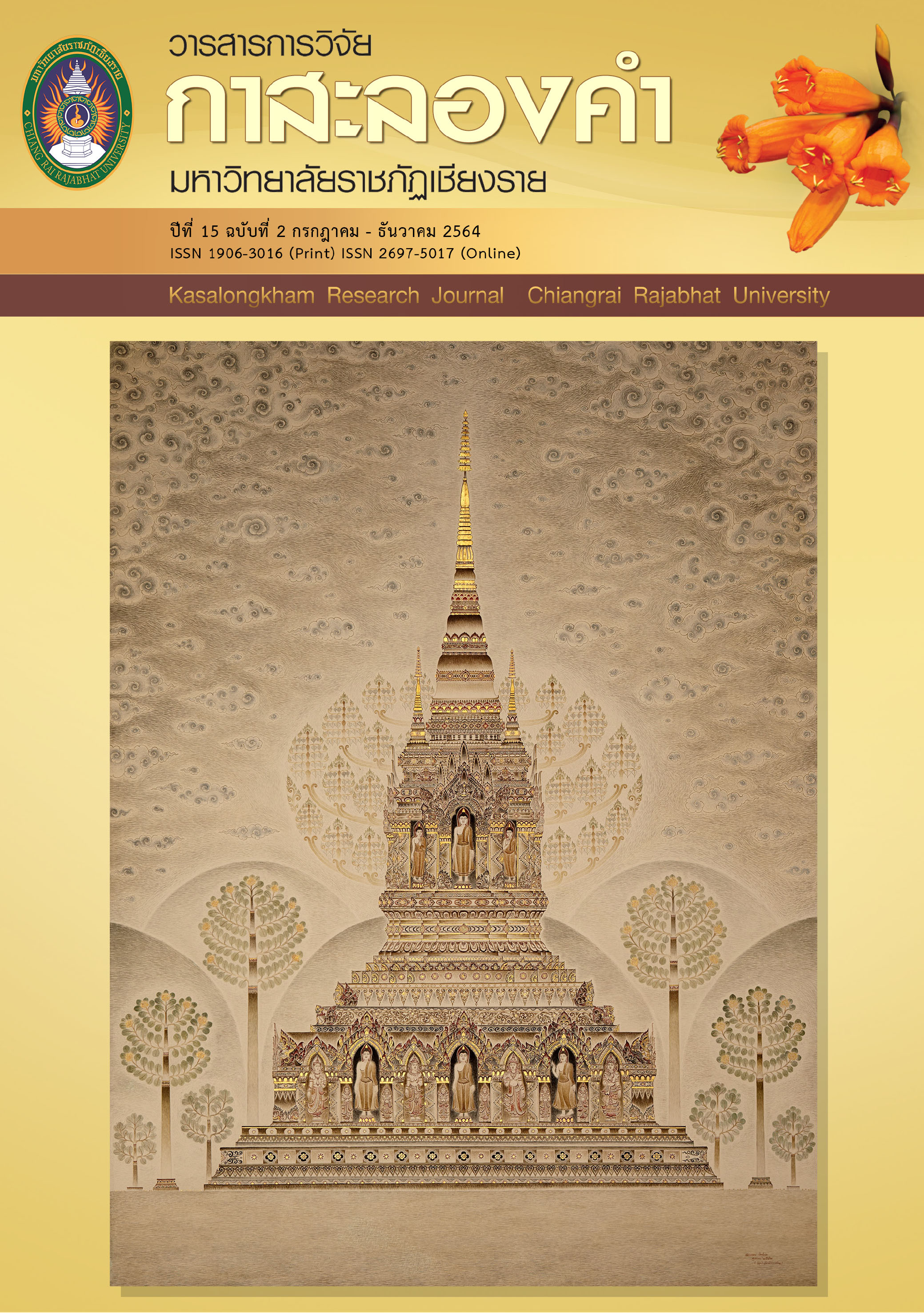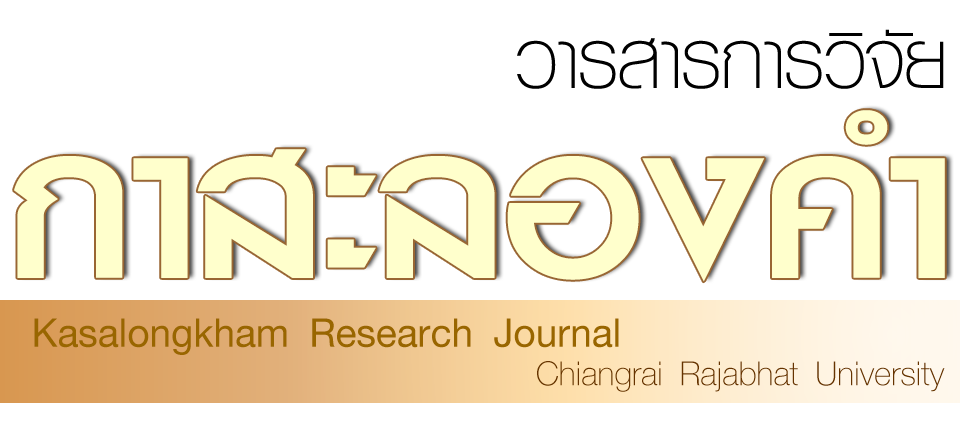กลยุทธ์การสื่อสารระหว่างวัฒนธรรมและการปรับตัวของนักศึกษาชาวจีน ที่เรียนภาษาอังกฤษเป็นภาษาต่างประเทศในมหาวิทยาลัยสังกัดรัฐบาลไทย : ศึกษากรณีมหาวิทยาลัยราชภัฏเชียงราย
คำสำคัญ:
Intercultural Communication Strategy, Self-adaptation, Chinese Studentsบทคัดย่อ
In the new globalization era, the requirements for internationalization have been driven in different higher educational institutions in order to update academic advancements, as well as to promote intercultural understandings and sustainable human developments. In other words, a variety of internationalizing methods including student and staff exchange, duo study programs, branch campuses, and distance learning can be implicated in all universities. Based on the mixed method, the major purposes of the study aimed to identify intercultural communication strategies used by Chinese students when interacting with Thais in a long-term Thai public university, as well as to investigate the Chinese students’ self-adaptation when encountering with their intercultural communication problems in a long-term Thai public university. For research methodology, using in-depth interview and questionnaire as a tool, 30 four-year Chinese students majoring in English Studies Program at the Faculty of Humanities, Chiang Rai Rajabhat University in the MOU with Pu’er Teachers’ College, Pu’er in Yunnan province of China were selected. The findings of the study revealed that all the aspects of the Chinese students’ intercultural communication strategies, with its mean of 2.08 and its standard deviation ( ) of 0.85, were sometimes used when interacting with Thais in a public Thai university as compared to each aspect, it showed that asking for repetition on the unclear pronunciation or unfamiliar expressions ( = 2.38, = 1.01) were frequently used, followed by avoiding talking about sensitive issues ( = 2.14, = 0.91) and using your own language to facilitate the communication ( = 2.14, = 0.93)., and using the partner’s mother tongue to facilitate the communication ( = 2.10, = 0.93).
เอกสารอ้างอิง
ASEAN: A Community of Opportunities, (2017) Catalogue-in-Publication Data Fact Sheet of ASEAN Economic Community (AEC) Jakarta, ASEAN Secretariat, May 2017 337.0959
Berardo, K., (2008). Intercultural communication strategies are used to overcome language barriers across cultures.
Canale, M., & Swain, M. (1980). Theoretical bases of communicative approaches to second language teaching and testing; “Applied Linguistics”, 1.
Chomsky, N. (1965). Aspects of the Theory of Syntax. Cambridge, MA: MIT Press Chulalongkorn.
Euamornvanich, P., (2017). Communication under the dimension of cultural diversity based on the concept of Geert Hofstede Communication through Multi-Cultural Dimensions of Geert Hofstede. Journal of Humanities and Social Sciences.
Fang, Fan & Zhang, Shuyi & Elyas, Tariq. (2020). Role of Prior Intercultural Learning in Chinese University Students' Cross-cultural Adaptation. Pertanika Journal of Social Science and Humanities. 28. 1599-1619
Ferguson, M. W., (2020). International colleges and the cultivation of social capital in a divided Thailand: A narrative study of leadership perspectives at a Bangkok-based campus. Education, Citizenship and Social Justice.
Gacel-Ávila, J., (2020). Internationalization of Higher Education in Latin America and the Caribbean:
Kanat, M. A., (2016). The Influence of Ideal L2 self, Academic Self- Concept, and Intercultural Communicative Competence on Willingness to Communicate in a Foreign Language. Eurasian Journal of Applied Linguistics.
Kang, Sun & Yossuck, Pradtana & Panyadee, Chalerm chai & Ek-lem, Bongkochmas., (2019). Influencing Factors of Cross-cultural Adaptation Process of Chinese Students Studying in the Upper Northern Thai Universities. Mediterranean: Journal of Social Sciences
Kim, Y. Y., (2017). Theory reflections: cross-cultural adaption theory. International Journal of Intercultural Relations; published: 13 December 2017
Konchiab, Kappina, & Charoennaiwongphao (2021) Needs for Improving Non-Verbal Communication Skills of Thai Homestay Staff in the New Normal Tourism Context, Chiang Mai. Published: Apr 30, 2021
Lathapipat, D., (2016) Inequality in education and wages. In: Phongpaichit, P, Baker, C (eds) Unequal Thailand: Aspects of Income, Wealth, and Power.
Nomnian, S. & Jhaiyanuntana, J. (2018). Chinese Overseas Students’ Perspectives on Benefits and Limitations of English Language Learning and Teaching between China and Thailand. Arab World English Journal, 9 .
Noonkong, U. R., Damnet, A., & Charttrakul, K., (2019). Developing nonverbal communication competence in requests and refusals of Thai university students: The intercultural interaction model. Journal of Liberal Arts, Prince of Songkhla University.
Office of the Higher Education Commission (OHEC), (2017) Manual for the Internal Quality Assurance for Higher Education Institutions First Edition: 1,800 copies, February 2017
Phumpho, R.& Nomnian, .S (2019) Challenges for Thai businesspeople using English in ASEAN, Kasetsart Journal of Social Sciences
Rastegar, M., Sadat, S. & Gohari, M., (2016). Communication strategies, attitude, and oral output of EFL learners: A study of relations. Open Journal of Modern Linguistics.
Rhein, D., (2017) International higher education in Thailand: Challenges within a changing context. Journal of Alternative Perspectives in the Social Sciences
Sarwari, Abdul Qahar & Wahab, Nubli., (2017). Study of the relationship between intercultural sensitivity and intercultural communication competence among international postgraduate students: A case study at University Malaysia Pahang. Cogent Social Sciences, 3:1, DOI: 10.1080/23311886.2017.1310479
Shen, Ming-yueh & Chiu, Tzu-yen. (2019). EFL Learners’ English-Speaking Difficulties and Strategy Use. Education and Linguistics Research
Sidra, T. J., (2020) Perspectives on the Intercultural Communication Strategy between China and Islamic Countries along Belt and Road Initiative: Global Media Journal, Vol.18 No. 34:203, 2020
Songsirisak, S. (2018). CROSS-CULTURAL ADAPTATION OF CHINESE STUDENTS: PROBLEMS AND SOLUTIONS Received: May 15, 2018, revised: July 2, 2018 & Accepted: 2018
Suwanasom, T., (2019). A Study on intercultural strategies in English as a lingua franca communication of Naresuan University graduate students. Journal of Liberal Arts Prince of Songkhla University.
Thanakong, K. and Adipattaranan, N. (2017). Using Communicative Language Teaching Activities to Enhance English Listening-Speaking Abilities and Grammatical Knowledge among Undergraduate Students. Chiang Mai. Chiang Mai University. Journal of Education Naresuan University. 19(4):51-64
Thao, T. & Duong, .T, (2020). Insights into Listening Comprehension Problems: A Case Study in Vietnam. 56
Tran, T. & Pham, P., (2016): International students in transnational mobility: intercultural connectedness with domestic and international peers, institutions, and the wider community, Compare: A Journal of Comparative and International Education,
Wang, F.D. & Zhang, M., (2016) Strategy for Cultivating Intercultural Communicative Competence in English Translation Teaching: Under the Belt and Road Initiative: Proceedings of the 2020 4th International Seminar on Education, Management and Social Sciences.
Wette, R. and Furneaux, C., (2018) Academic discourse socialization challenges and coping strategies of international graduate students entering English-medium universities. System, 78. pp. 186-200.
Xiuwen and Razali (2020). Challenge with intercultural communication faced by international Chinese students and the importance of developing intercultural communicative competence, Faculty of Educational Studies, University Putra Malaysia (UPM), Serdang, Malaysia.
Yan, Y., (2019) Factors Affecting the Decision-Making of the Chinese Students to Study in Higher Education Institutions in Thailand. Graduate School of Human Sciences, Assumption university, Thailand Vol. 38 No. 1 January-April 2020
Yang, Y., (2020), Study of Factors Affecting Chinese International Students’ Lecture-listening Comprehension at Thai Universities, Their Coping Strategies and Self-efficacy ICEEL 2020: 2020 The 4th International Conference on Education and E-Learning November 2020 Pages 121–126
Sidra, T. J., (2020) Perspectives on the Intercultural Communication Strategy between China and Islamic Countries: Along Belt and Road Initiative
Irwandi, I., Albert A., & Nur, .A. A., (2018) BUILDING TEACHERS’ INTERCULTURAL COMMUNICATION COMPETENCE IN THE DIGITAL ERA. 3rd International Conference on Education 2018 Teachers in the Digital Age Batusangkar, September 12-13, 2018






